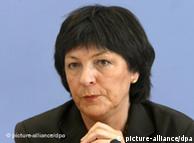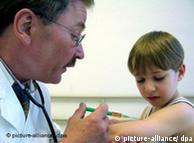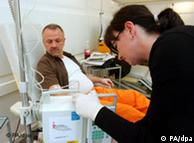德国 | 2008.01.09
健康体制改革等于提高保险费金额?
德国健康体制改革的核心部分是引入“健康基金”的机制。没有料到的是,这个经过议会批准的改革方案,在启动一年前,突然出现“难产”迹象,因为,一个健康 经济研究所推出一份报告说,这个基金将给刚刚稳定住的保险费金额再次松绑,促其上窜。那么,简单地说,健康体制改革就是提高老百姓的保险费金额?不那么简 单。
德国健康体制改革势在必行
德国大约8200万人口中,有4400万人在法定健康保险公司购买了健康保险。"法定"在这里的意思即"不是自愿",是 必须要完成的国家规定给每个公民的义务。这个巨大的人群里既包含了在职者,也包括失业者。过去年间,德国人口老龄化现象越来越普遍,加上经济不景气,失业 率升高的背景,法定健康保险行业成了谈虎色变的老大难,常年进项不抵付出,怎么提高保险费金额都是杯水车薪,不解决问题。如果没有国家的帮忙,真的听凭经 济规律的话,德国的法定保险公司估计有一半早已破产。
 Bildunterschrift: Großansicht des Bildes mit der Bildunterschrift: 德国联邦卫生部长施密特
Bildunterschrift: Großansicht des Bildes mit der Bildunterschrift: 德国联邦卫生部长施密特
这种情形下,改革势在必行。红绿政府从1998年上台伊始,就将改革德国健康体制定为重点目标,为此还撤换过不得力的卫 生部长。折腾数年之后,直到施罗德政府倒台,也没有拿出正式结果,幸亏施罗德手下的卫生部长施密特在默克尔大联合政府内继续留任,之前种种论证和争吵总算 没有白费。这样,在2007年2月2日这一天,德国联邦议会终于批准了德国健康体制改革的一揽子计划。
改革的核心是"健康基金"
这项改革计划的核心成分是2009年1月1日引入"健康基金"。它最重要的含义是:投保人和雇主不是象现在这样将保险金 额直接交到保险公司,而是投向一个叫做"健康基金"的机构,国家也投入数10亿欧元参与。每个保险公司都从这个基金中,按照投保人的多少,得到同样比例的 基本金额,再加上国家对老人和慢性病人专门拨出的支持。如果健康基金发放的金额仍然不够保险公司的支出,公司可以提高不超过投保人工资1%的"附加保险金 额"。
专家说,引入健康基金就是要提高保险费
现在,正是这个"健康基金"是否在明年年初启动,引起很大争议,起因是几天前位于慕尼黑的健康经济学研究所发表了一份调 研报告。这个报告指出,一旦引入"健康基金",法定保险费比例将会上涨到工资的15.5%以上,而目前的这个比例每个公司时不一样的,它们的平均值为 14.8%。
 Bildunterschrift: Großansicht des Bildes mit der Bildunterschrift: 儿童注射免疫
Bildunterschrift: Großansicht des Bildes mit der Bildunterschrift: 儿童注射免疫
就是"保险费比例要大幅上涨"这句话,在德国媒体引发了对健康体制改革的再次争议,这回焦点对准了"健康基金",各大报 纸杂志争相把"噩耗"以最现代化的手段传播开来。紧接着,法定健康保险公司的老总们也开始表态,Barmer总裁说,15.5%的保险金额完全有可能; Techniker总裁也说,保险金会上升,小数点前面的至少是15。
政府会尽全力保住健康改革
反对党抓住时机,攻击政府的改革方案。雇主协会也纷纷表示对明年准时启动"健康基金"至少可以先打上个问号。本来,该基金推出的时候,许多著名经济学家就对这个项目的经济可行性表示过怀疑,现在,这个几乎被淡忘了的疑点越来越大。
Calls grow for organ transplant revolution
· Medical chief urges new donor scheme
· Observer launches reform campaign
Jo Revill and Denis Campbell
Sunday January 13, 2008
The Observer
A revolution in the way organs are donated for transplant is called for today by the government's chief medical officer as concern grows over the acute shortage of donors and the rise in unnecessary deaths.
An expert report to be published this week says that every major hospital in Britain must have an organ donor specialist skilled in persuading grieving families that the hearts, lungs, kidneys and other vital organs of their deceased relatives should be used to save the lives of others.
Sir Liam Donaldson, England's chief medical officer, will back the findings of the government's taskforce on organ donation, but wants to go further and introduce a new system of donation because the shortage of organs is so severe. Three people a day are dying while on the waiting list for a transplant as the demand for a new organ is rapidly outstripping their supply.
Donaldson is advocating a system of 'presumed consent', where everyone in Britain would be presumed to be a donor unless they had specifically opted out, or unless their families had objections.
'We have one of the lowest rates [of organ donation] in Europe, far lower than Spain,' he told The Observer. 'We have one thousand or more patients dying on the waiting list each year, and there is a lot of suppressed demand, with doctors not even referring patients on to the list because there is no hope for them. That is a lot of patients dying.
'I think at the moment people often don't know whether their relative would have wanted to be a donor. Families are being approached when they are in a very distressed condition and, faced with uncertainty, their default position is to refuse consent. Often the quality of their dealing with clinical staff is not as good as it should be - the dialogue could be better. It does require considerable skill to handle such sensitive situations.'
Today we reveal the heartbreak of those who are waiting for organs and the uplifting stories of families who have consented to donate, and launch a campaign for the UK to move to the new system of presumed consent so that hundreds more lives can be saved.
The taskforce, set up by Health Secretary Alan Johnson to look at how to improve donation rates, is now considering the proposals for presumed consent. Their report out this week will say that the first step must be for the NHS to provide highly skilled organ co-ordinators who would be able to talk with sensitivity to relatives at the bedside of their loved ones.
They believe that there could be a 50 per cent increase in donated organs if hospitals became better at dealing with the highly sensitive conversations that take place when a patient has been confirmed braindead. At present, around one-third of families refuse to give consent for organ retrieval, and even when a patient carries a donor card, many families still refuse.
Last night the Prime Minister threw his weight behind the campaign to change the system. He said: 'I fully support the campaign The Observer has launched on this issue.'
And in an interview with the Sunday Telegraph, Gordon Brown said: 'A system of this kind seems to have the potential to close the aching gap between the potential benefits of transplant surgery in the UK and the limits imposed by our current system of consent.'
Ministers will embark shortly on a review of the existing system, but want a nationwide debate on the issue. But patients' groups made it clear that they did not want to see too much political interference in the matter. Katherine Murphy, of the Patients' Association, said: 'We don't think a private decision, which is a matter of individual conscience, should be taken by the state. If people want to give the gift of life, that is their right, but it must be something that is a voluntary matter.'
Under the opt-out system, doctors would automatically have the right to take organs from patients unless the patient had registered their refusal during their lifetime, and as long as the family were in agreement.
There are 9,600 people waiting for an organ, but last year only 3,100 operations were carried out. Some people are flying abroad to have kidney transplants, but this leaves them at risk of picking up infections.
The report will call for a UK-wide organ donation body to be placed within the NHS. The body would manage a new group of more than 250 transplant co-ordinators who would be given a much bigger role in talking to relatives at an early stage, explaining the clinical guidelines and addressing their fears. Once the relatives had agreed that the patient's organs could be taken, the co-ordinator would oversee all the arrangements.
The taskforce, headed by Elisabeth Buggins, chairwoman of the Birmingham strategic health authority, will also recommend that specialist 'retrieval teams' should be run by the new agency. They would be sent out to 'harvest' organs from a patient, rather than relying on local teams.
Donaldson does acknowledge that some people will never want their organs, or their relatives' organs, to be given. He said if they moved to the new presumed consent system 'it would be made clear that they have an inalienable right to opt out.'

沒有留言:
張貼留言